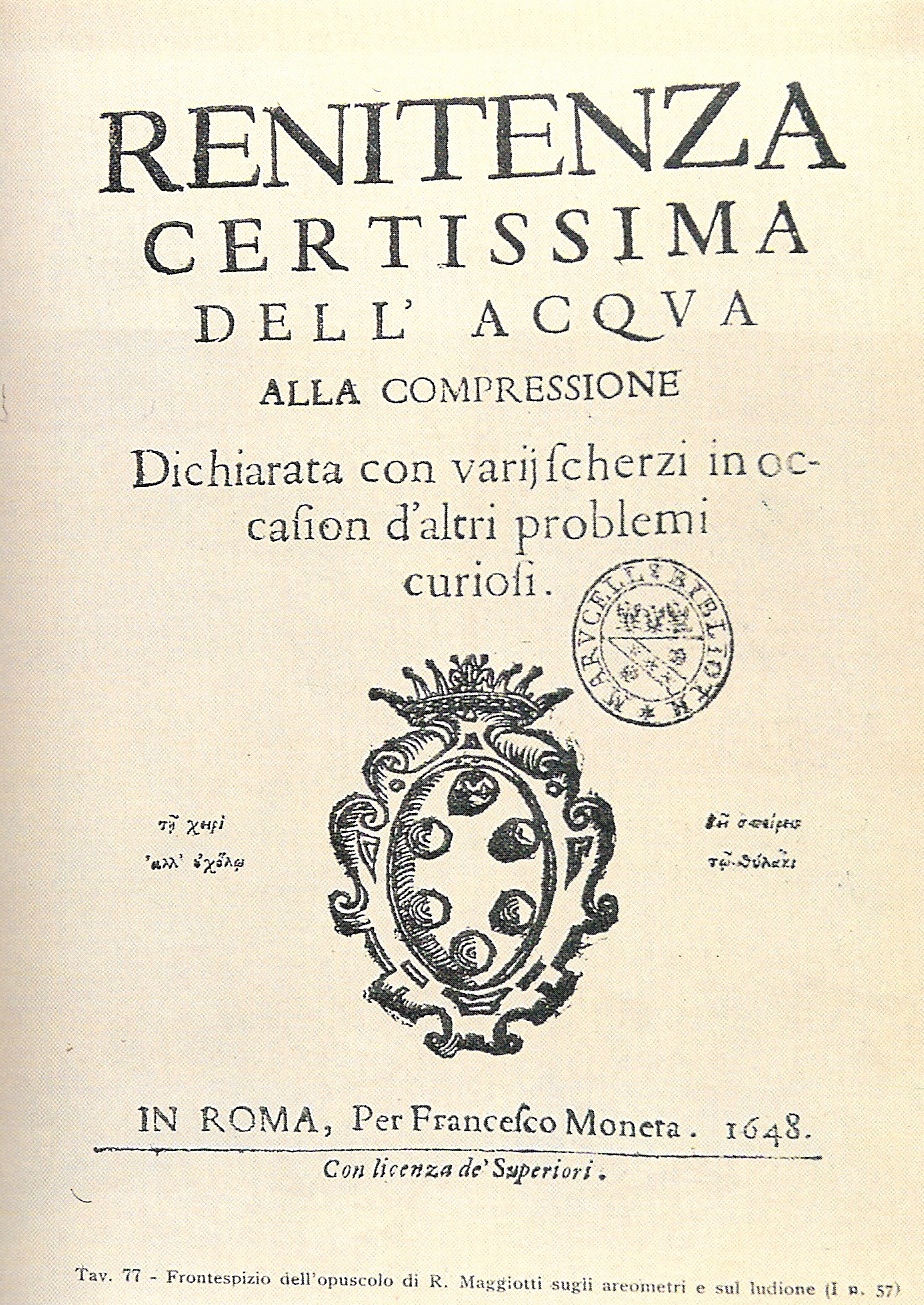Raffaello Magiotti on:
[Wikipedia]
[Google]
[Amazon]
 Raffaello Magiotti (1597–1656) was an Italian
Raffaello Magiotti (1597–1656) was an Italian
 Raffaello Magiotti (1597–1656) was an Italian
Raffaello Magiotti (1597–1656) was an Italian astronomer
An astronomer is a scientist in the field of astronomy who focuses their studies on a specific question or field outside the scope of Earth. They observe astronomical objects such as stars, planets, natural satellite, moons, comets and galaxy, g ...
, mathematician
A mathematician is someone who uses an extensive knowledge of mathematics in their work, typically to solve mathematical problems.
Mathematicians are concerned with numbers, data, quantity, structure, space, models, and change.
History
On ...
and physicist
A physicist is a scientist who specializes in the field of physics, which encompasses the interactions of matter and energy at all length and time scales in the physical universe.
Physicists generally are interested in the root or ultimate caus ...
. Born at Montevarchi
Montevarchi is a town and ''comune'' in the province of Arezzo, Tuscany, Italy.
History
The town of Montevarchi sprang up around 1100, near to a fortified Benedictine monastery, founded by bishop Elempert (986–1010) of Arezzo. At first the cas ...
, he studied at Florence
Florence ( ; it, Firenze ) is a city in Central Italy and the capital city of the Tuscany region. It is the most populated city in Tuscany, with 383,083 inhabitants in 2016, and over 1,520,000 in its metropolitan area.Bilancio demografico an ...
, and, having taken his vows, moved to Rome
, established_title = Founded
, established_date = 753 BC
, founder = King Romulus (legendary)
, image_map = Map of comune of Rome (metropolitan city of Capital Rome, region Lazio, Italy).svg
, map_caption ...
, following Cardinal Sacchetti. In 1636, he began to work at the Vatican Library.
A pupil of Castelli in Rome, in 1638 he was Castelli's tip to Galileo
Galileo di Vincenzo Bonaiuti de' Galilei (15 February 1564 – 8 January 1642) was an Italian astronomer, physicist and engineer, sometimes described as a polymath. Commonly referred to as Galileo, his name was pronounced (, ). He was ...
as the candidate for the chair of Mathematics at Pisa
Pisa ( , or ) is a city and ''comune'' in Tuscany, central Italy, straddling the Arno just before it empties into the Ligurian Sea. It is the capital city of the Province of Pisa. Although Pisa is known worldwide for its leaning tower, the cit ...
. Well at home in the scientific community in the Papal city, Magiotti actively participated in Roman scientific debates, on which he provided detailed information to Galileo, with whom he was often in touch.
During his life, Magiotti published only one work, entitled Renitenza dell’acqua alla compressione (Water's Resistance to Compression), which came out in 1648.
The text was the first report of the practical resistance to compression - which Magiotti mistakenly claimed to be absolute - of water at constant temperature, as well as the expansion and contraction of fluid media (water and air) subjected to changes in temperature. In addition to descriptions of various thermometers, the work also presents an illustration of the bell-jar divers, or "Cartesian devils", the discovery of which would then be attributed to the Tuscan scientist.
Magiotti played a role in the context of experimentation which preceded, and to a large extent, prepared the way, for the torricellian barometric experiments. He assisted - giving full descriptions in various letters - in the syphon experiments performed by Gasparo Berti
Gasparo Berti ( 1600–1643) was an Italian mathematician, astronomer and physicist. He was probably born in Mantua and spent most of his life in Rome. He is most famous today for his experiment in which he unknowingly created the first working ba ...
around 1640. In a letter to Mersenne from 1648, he recalled that happy experimental period, and revealed that he had told Torricelli about the tests performed by Berti. He also suggested the use of sea-water, which is more dense than fresh water, thus making possible the decisive choice of mercury in barometric experiments. He died of the plague
Plague or The Plague may refer to:
Agriculture, fauna, and medicine
*Plague (disease), a disease caused by ''Yersinia pestis''
* An epidemic of infectious disease (medical or agricultural)
* A pandemic caused by such a disease
* A swarm of pes ...
in 1656.
External links
* 1597 births 1656 deaths 17th-century Italian astronomers 17th-century Italian mathematicians 17th-century Italian physicists People from the Province of Arezzo {{Italy-scientist-stub